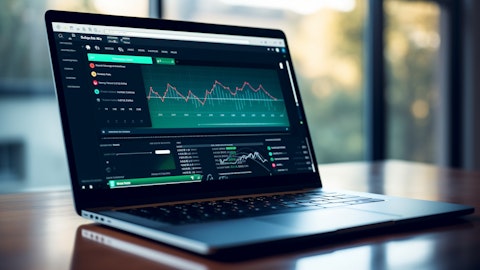We recently compiled a list of the 8 Best Scientific Instruments Stocks to Buy. In this article, we are going to take a look at where Agilent Technologies, Inc. (NYSE:A) stands against the other scientific instruments stocks.
A scientific instrument is a device or tool used for scientific purposes, including the study of natural phenomena and theoretical research. These instruments are designed to facilitate theoretical research and are utilized to measure, analyze, and verify the properties of materials and elements. Scientists have worked in laboratories equipped with an ever-evolving array of scientific instruments for hundreds of years. In the 1990s, benchtop automation devices spurred a surge in productivity and discoveries, further enhanced by computerized networking in the 2000s and 2010s. Today, most pharmaceutical companies’ R&D labs remain at this advanced stage, featuring sophisticated centrifuges and stations that have been instrumental in making significant health advancements.
The global scientific instrument market reached $44.1 billion in 2023 and is projected to grow to $67.5 billion by 2032, with a compound annual growth rate (CAGR) of 4.7% during the period from 2024 to 2032. The primary driver of demand in the global scientific instrument market is the growth of the research and development sector. Additionally, increased collaboration between governments and manufacturers to equip government and university laboratories, as well as other research institutions, with the best instruments is expected to contribute to market growth. Furthermore, the integration of scientific instruments with computers enhances their functions, allows for parameter adjustments, and streamlines data sampling, collection, resolution, and analysis, thus further expanding the global demand for scientific instruments.
In addition, the scientific instruments market has been segmented into various categories. According to a report by Allied Market Research, the clinical analyzers segment is projected to generate the highest revenue from 2021 to 2030. This growth is driven by the increasing adoption of point-of-care testing devices and laboratory automation, as well as the rise in chronic conditions requiring clinical analyzers for diagnosis. Additionally, the research segment is anticipated to experience the fastest compound annual growth rate. This is due to the rising demand for scientific instruments in the research of chronic conditions such as cardiovascular diseases, cancer, and neurological diseases, along with the development of advanced instruments for research purposes.
Science heavily relies on technology, and without sophisticated instruments designed to meet the demands of experiments and test new or existing theories and models, scientific progress would stall. A prime example is the life sciences industry, which has produced groundbreaking innovations such as COVID-19 vaccines, cancer immunotherapies, glucose monitors, and pacemakers. Another emerging trend is the use of AI in laboratories. According to a report, the global life science analytics market size is projected to grow from $15.27 billion in 2023 to $43.86 billion by 2032, at a compound annual growth rate (CAGR) of 11.8%. Another growing trend comes in the form of Generative AI (gen AI), which is set to revolutionize nearly every aspect of the life sciences, and in turn, the scientific instruments sector. According to McKinsey, gen AI could create $60 billion to $110 billion in annual economic value for pharmaceutical and medtech companies, with $18 billion to $30 billion of that value coming from commercial functions alone.
With these details in mind, we will now take a look at the best scientific instruments stocks to buy.
Our Methodology
To compile the list of the best scientific instruments stocks to invest in, we focused on companies listed on the New York Stock Exchange and Nasdaq that are involved in the scientific instruments industry. The stocks were ranked according to Insider Monkey’s database, which tracks 919 hedge funds as of the end of Q1 2024. The ranking is based on the ascending order of the number of hedge fund investors in each stock. Why are we interested in the stocks that hedge funds pile into? The reason is simple, our research has shown that we can outperform the market by imitating the top stock picks of best hedge funds. Our quarterly newsletter’s strategy picks 14 small and large-caps every quarter and it has returned 275% since May 2014, beating its benchmark by 150 percentage points (see more details here).

A laboratory technician at an advanced diagnostic machine.
Agilent Technologies, Inc. (NYSE:A)
Number of Hedge Fund Holders: 37
Agilent Technologies, Inc. (NYSE:A) delivers specialized solutions for the life sciences, diagnostics, and applied chemical markets globally. Its Life Sciences and Applied Markets segment features an array of instruments and systems, such as liquid chromatography, mass spectrometry, gas chromatography, atomic absorption, and microwave plasma-atomic emission spectrometry instruments.
Earlier this May, Agilent Technologies, Inc. (NYSE:A) reported its second quarter earnings results, with revenue coming in at $1.57 billion, marking an 8.4% decline on a reported basis and a 7.4% decrease on a core basis compared to the same quarter in 2023. The company’s GAAP net income for the quarter was $308 million, or $1.05 per share, up slightly from $302 million, or $1.02 per share, while its Non-GAAP net income came in at $356 million, or $1.22 per share, down from $377 million, or $1.27 per share, in the prior year. Additionally, Agilent Technologies, Inc. (NYSE:A) has revised its full-year revenue outlook to a range of $6.420 billion to $6.500 billion, representing a decrease of 6.0% to 4.9% on a reported basis and a decline of 5.4% to 4.3% on a core basis.
Analyst ratings for Agilent Technologies, Inc. (NYSE:A) have been mixed following these announcements. Goldman Sachs maintained its Buy rating on the stock with a price target of $145.00, viewing the guidance update as a potential early indicator of challenges for other companies with significant exposure to China and the instrument sector. Conversely, BofA Securities lowered its price target to $134 from $145, maintaining a Neutral rating on the company. The firm cited slower-than-expected order acceleration and expressed skepticism about a rebound in the second half of the fiscal year.
As of the end of the first quarter of 2024, 37 hedge funds tracked by Insider Monkey held stakes in Agilent Technologies, Inc. (NYSE:A), a slight decline from the 39 hedge funds in the previous quarter.
Overall A ranks 6th on our list of the best scientific instruments stocks to buy. You can visit 8 Best Scientific Instruments Stocks to Buy to see the other scientific instruments stocks that are on hedge funds’ radar. While we acknowledge the potential of A as an investment, our conviction lies in the belief that AI stocks hold greater promise for delivering higher returns, and doing so within a shorter timeframe. If you are looking for an AI stock that is more promising than A but that trades at less than 5 times its earnings, check out our report about the cheapest AI stock.
READ NEXT: Analyst Sees a New $25 Billion “Opportunity” for NVIDIA and Jim Cramer is Recommending These 10 Stocks in June.
Disclosure: None. This article is originally published at Insider Monkey.





